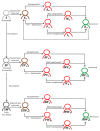Projecting the Impact of SARS-CoV-2 Variants and the Vaccination Program on the Fourth Wave of the COVID-19 Pandemic in South Korea
- PMID: 34300029
- PMCID: PMC8306637
- DOI: 10.3390/ijerph18147578
Projecting the Impact of SARS-CoV-2 Variants and the Vaccination Program on the Fourth Wave of the COVID-19 Pandemic in South Korea
Abstract
Vaccines against severe acute respiratory syndrome coronavirus 2 (SARS-CoV-2) are currently administered in South Korea; however, vaccine supply is limited. Considering constraints in vaccine supply and the emergence of variant strains, we evaluated the impact of coronavirus disease (COVID-19) vaccination program in reducing incidence, ICU hospitalization, and deaths in South Korea. We developed an age-structured model of SARS-CoV-2 transmission parameterized with Korean demographics and age-specific COVID-19 outcomes. Using our model, we analyzed the impact of the COVID-19 vaccination program during the fourth wave of the pandemic in South Korea in reducing disease burden. We projected that the vaccination program can reduce the overall attack rate to 3.9% from 6.9% without vaccination, over 150 days, starting from 5 July 2021. The highest relative reduction (50%) was observed among individuals aged 50-59 years. Vaccination markedly reduced adverse outcomes, such as ICU hospitalizations and deaths, decreasing them by 45% and 43%, respectively. In the presence of the Delta variant, vaccination is expected to reduce the overall attack rate to 11.9% from 26.9%. Our results indicate that the impact of vaccination can be substantially affected by the emergence of SARS-CoV-2 variants. Furthermore, herd immunity is unlikely to be achieved with the potential emergence of the Delta variant, inconsistent with the blueprint of the South Korean government.
Keywords: COVID-19; Korea; SARS-CoV-2; herd immunity; mathematical model; vaccine; vaccine allocation strategy.
Conflict of interest statement
The author does not have commercial or other association that might pose a conflict of interest.
Figures




References
-
- WHO COVID-19 Weekly Epidemiological Update. [(accessed on 5 July 2021)]; Available online: https://www.who.int/emergencies/diseases/novel-coronavirus-2019/situatio....
-
- Galloway S.E., Paul P., MacCannell D.R., Johansson M.A., Brooks J.T., MacNeil A., Slayton R.B., Tong S., Silk B.J., Armstrong G.L. Emergence of SARS-CoV-2 B.1.1.7 Lineage—United States, December 29, 2020-January 12, 2021. Mmwr. Morb. Mortal. Wkly. Rep. 2021;70:95–99. doi: 10.15585/mmwr.mm7003e2. - DOI - PMC - PubMed
Publication types
MeSH terms
Substances
Grants and funding
LinkOut - more resources
Full Text Sources
Medical
Miscellaneous

